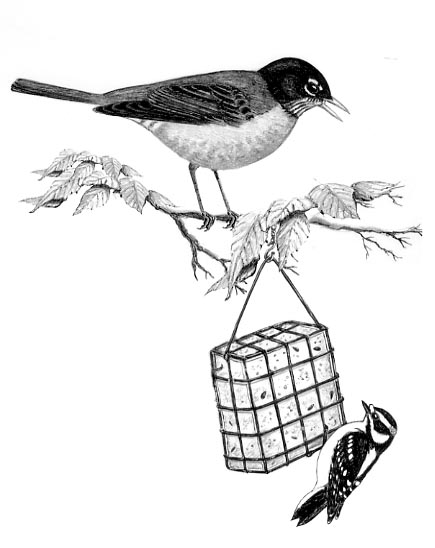
Dear Bird Folks,
I’m concerned about an obese robin in our yard. The bird sits above my suet feeder attacking the woodpeckers that are trying to feed from it. Is this behavior unusual?
-Patty, Wellfleet, MA
This may Surprise you Patty,
But I’m not as organized as my weekly sophisticated reposes might otherwise indicate. I have stacks of half-read books, with dog-eared pages, which topple over every time I answer the phone. There are dozens of questions taped to my computer, turning brown as they patiently wait to be answered. We receive questions via e-mail, the fax machine, letters, or in person. My least favorite are those notes which are tied to rocks and tossed through the front window. Why can’t my mother simply use the phone like most parents?
Today I was sorting through a stack of paperwork, brushing aside the overdue invoices and those annoying tax forms, hoping to find a question that I actually knew the answer to. That’s when I found your question Patty, a lovely hand written note on green paper. I have no idea how long your note has been in this pile, but the tax form next to it is dated February 1992. 1992? Sweet! Looks like I’m getting caught up.
An obese robin eh? Although I didn’t see it, I’m pretty sure that your robin wasn’t actually “obese.” Nature has no place for out-of-shape creatures. I’m talking about real nature here, not those fat things we call pets. Black Labs that need a ramp to get into the back of the station wagon or cats that clean the floor as they walk wouldn’t last long in the wild. Nature runs a tougher conditioning program than you’d find at any gym. The sluggish one in the flock is usually the first one on the menu of some predator.
Robins are naturally stocky. They spend much of their time on the ground, walking, running or hopping after prey and thus they have strong, sturdy legs. Their bodies are more robust than their sleeker relatives, which may help them survive further north, during the winter. When birds aren’t well, they fluff out their feathers to help them conserve heat and they may appear to be fatter than unusual. But fluffy birds are usually in trouble and probably wouldn’t have the energy required to defend a food source.
Birds often defend their food, but usually only from their own kind. Finches are always squabbling amongst themselves at the feeder, yet they rarely bother the chickadees. The chickadees ignore the nuthatches, but will attack each other. The salt water pond near my house has tons of birds feeding in it, but if more than one Great Blue Heron arrives, the fight is on. A noted exception is the Northern Mockingbirds. They don’t much care who comes near their feeding territory or why. They will go after any bird that comes close. For the most part robins get along with other birds, but, as you observed Patty, they do have a bit of mockingbird in them.
It’s hard to know what causes some robins to be aggressive, while others are more passive. Many of us have had robins attack their own reflections in our windows, while other robins could care less. Sometimes robins will share a berry bush with other fruit eaters, but other times even a single robin will keep an entire flock of other birds away. Why? Naturalists feel that birds which were exposed to John Wayne movies at a young age, are often more aggressive. It’s a global phenomenon known to researchers as the Duke-syndrome.
Robins are one of the most abundant birds in North America. They are found from northern Alaska to the tropics of Mexico. The next time you are bored, open up your field guide and check out the robin’s range map. There are no gaps. Robins nest in every state and in every province on the continent. Their flexibility has allowed them to adapt to the many changes man has made to the landscape. Not only are robins flexible, but they are plenty tough. They haven’t become such a successful species by being wimps. They are able to do whatever it takes to survive. And if that involves beating up your woodpeckers, so be it.
Since your note was not dated, I have no idea in which season these robin/woodpecker battles took place. I can only guess that they happened at a time when natural food was in short supply. That aggressive robin found your suet and it wasn’t about to share it with any tree hugging woodpecker. I would also guess that as soon as the natural food became more available, the robin moved on.
Speaking of moving on, I have to go. A rock just crashed through my front window. Apparently Mom has another question.